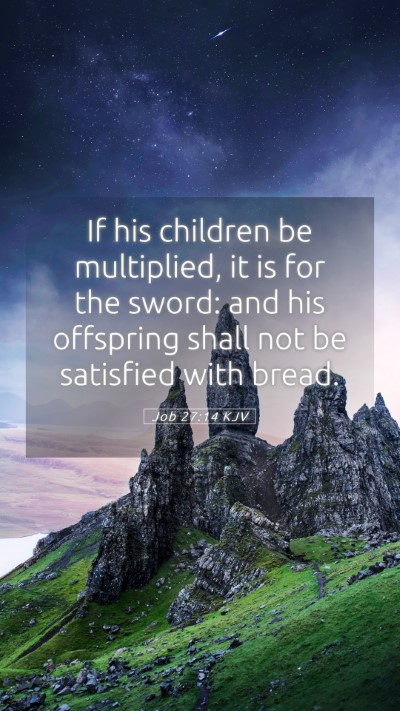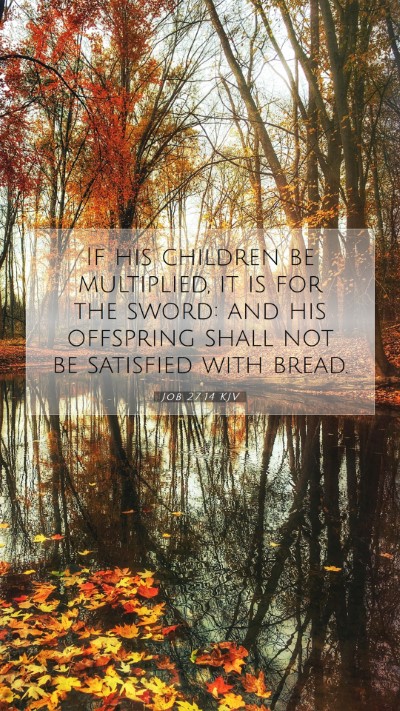Old Testament
Genesis Exodus Leviticus Numbers Deuteronomy Joshua Judges Ruth 1 Samuel 2 Samuel 1 Kings 2 Kings 1 Chronicles 2 Chronicles Ezra Nehemiah Esther Job Psalms Proverbs Ecclesiastes Song of Solomon Isaiah Jeremiah Lamentations Ezekiel Daniel Hosea Joel Amos Obadiah Jonah Micah Nahum Habakkuk Zephaniah Haggai Zechariah MalachiJob 27:14 Meaning
What is the meaning of Job 27:14?
If his children be multiplied, it is for the sword: and his offspring shall not be satisfied with bread.
Job 27:14 Bible Verse Meaning
Understanding Job 27:14
Verse: Job 27:14 - "If his children be multiplied, it is for the sword: and his offspring shall not be satisfied with bread."
Summary of Meaning
This verse from the Book of Job reflects Job's understanding of the fate of the wicked, suggesting that prosperity for the unrighteous may lead to their downfall and judgment. Job articulates a consequence for those who oppose righteousness, emphasizing that even if they appear to thrive, their end will be tragic. This perspective aligns with the themes of justice and divine retribution that permeate the text, revealing Job's firm belief in God's eventual judgment upon iniquity.
Biblical Exegesis and Commentary Insights
Matthew Henry's Commentary
Matthew Henry explains this verse in the context of Job's discourse on the fate of the wicked. He points out that Job is illustrating the concept that the blessings enjoyed by the wicked – such as having many children – do not result in lasting happiness or fulfillment. Instead, they are warned that their progeny may face destruction. This serves to remind the faithful that outward success is not a testament to God's favor, but rather a potential precursor to their divine judgment.
Albert Barnes' Commentary
Albert Barnes emphasizes the assurance that even if the wicked thrive temporarily, their ultimate outcome is dire. Barnes interprets the reference to children and sustenance as indicating that despite outward appearances of prosperity, there is a spiritual void that cannot be filled. Barnes interprets this as a warning to the righteous to remain steadfast in faith, knowing that divine justice will be served in due time, and that the joys of the righteous shall be fulfilled ultimately unlike those of the wicked.
Adam Clarke's Commentary
Adam Clarke elaborates on this verse by highlighting the severe implications of rejection of divine principles. He notes that Job is communicating what he perceives as a divine principle – that sin does not go unpunished. Clarke points out that Job is not merely lamenting his own condition but rather providing a broader commentary on the state of the wicked and their fleeting joys. In this context, the verse serves as a stark reminder of the ultimate fate awaiting those who live in opposition to God's commands.
Cross References to Job 27:14
- Psalm 37:28: "For the Lord loves justice; He will not forsake His saints." - Reflecting God's commitment to justice.
- Proverbs 10:27: "The fear of the Lord prolongs days, but the years of the wicked will be shortened." - Highlighting the contrast between the wicked and the righteous.
- Malachi 3:18: "Then you shall again discern between the righteous and the wicked, between one who serves God and one who does not serve Him." - Affirming the eventual distinction made by God.
Applications for Daily Life
The insights drawn from Job 27:14 can provide profound applications for modern believers. It reminds us to evaluate the nature of prosperity and to understand that true fulfillment comes from aligning with God's will rather than seeking worldly success. In Bible study groups, this verse can provoke discussions about the nature of justice and the long-term implications of our actions. Believers are encouraged to maintain faith in God's righteous judgment, especially when witnessing injustices in the world.
Conclusion
In summary, Job 27:14 serves as a powerful reminder that God's justice prevails, regardless of how life may appear at the moment. The combined insights from Matthew Henry, Albert Barnes, and Adam Clarke provide a rich understanding of the implications of righteousness and the fate of the wicked. As members of Bible study groups delve into these meanings, they will find a stronger resolve to live in accordance with God's principles, fostering a life of hope amid challenges.


